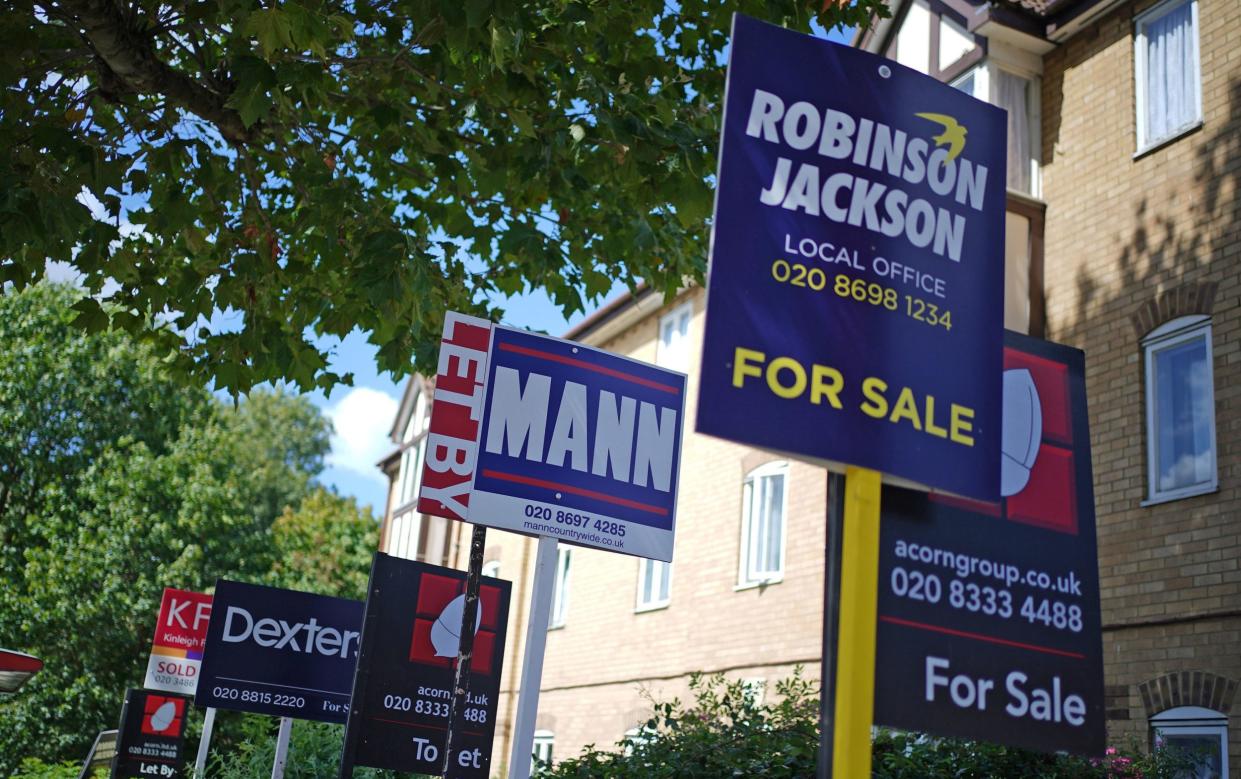Unless the Tories can once more be the party of home ownership, they are finished

- Oops!Something went wrong.Please try again later.
On the Government’s dashboard, lots of indicators are flashing red. Net migration, GDP per capita growth, the tax burden – all of these statistics are heading in the wrong direction for Rishi Sunak.
Last week, the English Housing Survey added another to the list. According to its latest data release, home ownership rates in England and Wales have flatlined at 65 per cent, down from a peak of 71 per cent in 2003. It is the data for younger cohorts that we ought to look closer at, though. While the figure for the 25-34 age bracket is marginally up on the 2021-22 level, it is 3 per cent down on the year before that. More broadly, homeownership for this group remains a third lower than it was in the 1990s.
It is difficult to overstate just how damaging these trends are for the cause of popular capitalism in Britain. Homeownership is the defining aspirational ideal in our society, and the essence of the “British Dream”. That homeownership rates are steady for older cohorts yet have diminished so considerably for younger ones is sapping the moral legitimacy of the way our economy in organised and fostering intergenerational tensions.
The implications of declining homeownership are devastating for the Conservative Party in particular. Since 1945, the ideal of private property ownership has created a powerful dividing line between its own principles and those of its opponents.
Conservatism believes in the transformational effects of private property on the psychology of the owner. It gives them a practical medium for the expression of their personality, something to pass on to family, and a vital sense of stake in both the local and wider community. Most important of all, property gives the owner a sense of responsibility. To own is to be responsible (as in when we “own up”, we take responsibility for our actions), and thus, the conservative case goes, ownership equips people to be good citizens.
For decades, Conservatives from Churchill to Thatcher have juxtaposed a vision of widespread private property ownership against political creeds supportive of centralised ownership. Conservatism, it has long been argued, wishes to help individuals and households to achieve their ambitions for self-sufficiency and independence, whilst the Left suppresses those ambitions. Yet this juxtaposition is much harder to maintain when ownership is being annexed to a narrower and narrower cross-section of the British population. The Conservatives are increasingly the party of existing homeowners, rather than the party of widening homeownership.
The Labour Party has thus spied a remarkable opportunity. Various figures from the Left have underscored that a Labour government would be committed to building new council housing, which remains immensely popular with party members. But Starmer himself is pitching squarely at young renters who wish to become homeowners. That is the reason he feels comfortable speaking admiringly about Thatcher, the Prime Minister who helped millions of working class people realise their aspirations of ownership through Right to Buy.
The last time that Labour was able to associate itself with aspiration, and with those in this country that desire a fair chance of working hard and getting on in life, they eviscerated the Conservatives, and found themselves in power for over a decade.
Which is why the salience of this development for the Conservatives is so calamitous. Policy debates come and go, and a governing party need not win on every topic to retain the confidence of the electorate. But ceding something as fundamental as an association with aspiration and ambition would be a political defeat of a different order of magnitude for the Tories.
A generation of people who are given the opportunity of owning their own home under a Labour Government would never vote Conservative again. In seeking to rebrand Labour as the party of homeownership, Keir Starmer is attempting something that none of his predecessors have meaningfully achieved. If he succeeds, Rishi Sunak will have overseen the loss of perhaps the Conservative’s most important and reliable electoral asset.
Perhaps this whole debate is a red herring. Indeed, there are some who have argued that we should simply jettison the dream of homeownership altogether, and move towards a housing market like Germany’s, with high levels of private renting.
Yet if young people are increasingly disaffected with capitalism because of their inability to become property owners, surely our response should not be to deny them the opportunities that were afforded to previous generations? A 2014 survey found that given a free choice, 86 per cent of people prefer to own their own home. Surely our duty as a country is to enable hardworking individuals and households to achieve such aspirations?
Benjamin Disraeli once said that whilst the politician thinks of the next election, the statesman thinks of the next generation. Happily for Sunak, these two imperatives intersect: but unless the Conservatives can start speaking to the hopes and aspirations of the next generation again, their electoral prospects look very bleak indeed.
James Vitali is Head of Political Economy at Policy Exchange. He is the author of The Property Owning Democracy

